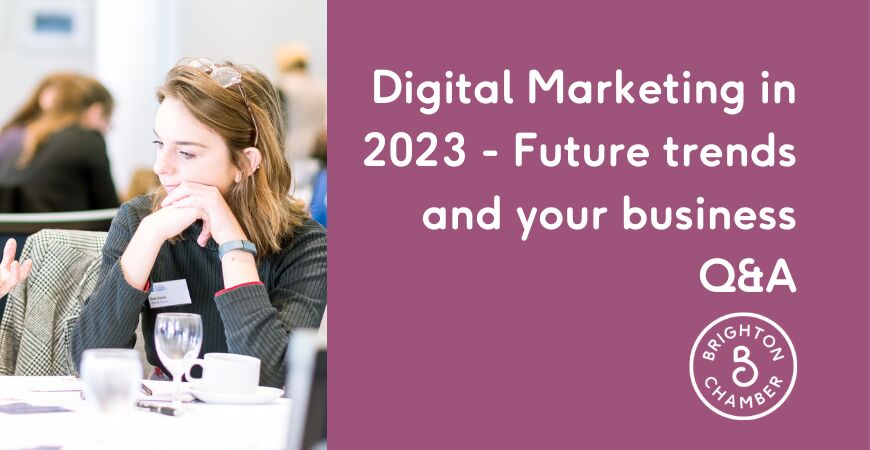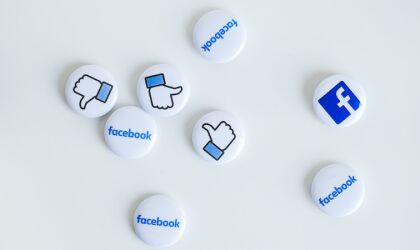

Tue 17 / 01 / 23
Q&A: Digital marketing trends in 2023
Amy Lishman, Head of Member Engagement, speaks to Barney Durrant about what the next digital marketing trends will be and what they mean for your business. Barney is Director of Bluebell Digital, a marketing agency which offers digital strategy and marketing consultancy.
By Frank Hyde of Brighton Chamber
What do you see as the biggest trends in Digital Marketing for 2023?
Obviously, there’s a wide range of things happening online, and I couldn’t possibly capture all of them – but here’s a few I’ve picked out that will be important both this year, and on an ongoing basis:
1. Shortform video
You’ve all heard about TikTok – it’s really exploded in the last couple of years as a platform for shortform videos, mobile-optimised 10-60 seconds videos. That kind of format is very much taking over, not only because of TikTok’s influence, but because other platforms like Facebook or Instagram will tend to copy those popular trends.
This is seen in Instagram Reels, launched in the last couple of years, as well as YouTube shorts. So, if you’re creating longer videos for your business, you might want to consider shortening your content or tailoring it a bit more for shorter attention spans – as well as making it mobile-first.
2. Social media
TikTok is a growing force and will continue to be so this year. It tends to be used by younger people, although it’s starting to broaden its appeal. In contrast, some of the bigger companies like Facebook are starting to lose a bit of their grip – it’s still a huge platform, but numbers are starting to decline slowly.
New, more niche platforms like BeReal are emerging, the idea being that you take one picture a day which is more authentic and less curated than Instagram. Another platform emerging America is Gas, specifically amongst highschoolers, and that’s all about praising your classmates in an effort to move away from the negativity often associated with social media.
3. Augmented reality
Apple are due to launch their Augmented Reality glasses later this year. Facebook already have their Oculus Virtual Reality glasses, but these ones will be Augmented Reality, which means they overlay the virtual aspect onto the real world. Apple have a habit of transforming spaces and markets when they launch new products, so there’s some expectation that this release will make augmented reality more popular.
4. Brand marketing
There’s likely to be a much higher focus on brand marketing in digital this year, for a couple reasons. Positive reasons might be that digital is quite mature now, so people have kind of maxed out what they can do with performance marketing and may be looking for other areas for their business to expand into, for which they will need more traditional forms of building awareness. On the other hand, a cynical take would be that due to reduced tracking abilities of platforms like Facebook, there’s less traceability, so people are forced to talk more about ‘fluffy’ metrics like brand awareness. Either way, there will definitely be a focus on brand marketing and raising awareness long-term, rather than generating sales instantly.
5. AI software
There’s been a surge in popularity in AI software. This began with art programs like Midjourney and DALL-E - you type in a prompt and it generates an image based on your input. There was a lot of talk about how ethical that is, as it’s building on work from other artists. Similarly, for text there is a program called ChatGPT which can generate articles, conversations and code based on prompts you put in. I would say that the content it generates is interesting, and might be good to build upon or to generate ideas, but doesn’t have the ability to make exciting and original content. So, although these tools can be used for the simple tasks and are fun to play with, you shouldn’t rely on them.
How effective is TikTok for business to business interactions?
TikTok’s not the most obvious or effective tool to use for business to business (B2B) marketing; it definitely has a youthful audience. I can see it taking a similar trajectory to YouTube, which was originally famous for fun, silly videos and therefore a hard sell for advertisers. But, as it got more mature with a wider range of users, it developed more serious content which was more relevant to B2B advertisers.
In the same way, TikTok is slowly leaning towards more serious and advertiser-friendly content, which will continue for the next couple of years. Opportunity is always there if you do things right, and there’s definitely potential for it to be harnessed by B2B advertisers - but currently it’s more applicable for B2C organisations selling youth-oriented goods like clothing and entertainment.
What is the Metaverse?
The Metaverse was actually a term coined in a 1992 Science-Fiction novel called Snow Crash, though it was also used in Ready Player One. It’s a fictional concept of an artificial virtual universe which connects a series of smaller virtual worlds.
The internet is currently a two-dimensional experience - we interact with it through a screen or a device. The idea of the Metaverse is that it would be fully immersive, so that you experience it directly as yourself – or using an avatar – by travelling around in it. It’s seen by many as the next stage of computing, but it’s not yet widely used due to limitations in technology, price, accessibility, and general appeal.
In terms of how it affects your business, basically it doesn’t exist just yet so you don’t really need to worry about it (despite what Facebook might tell you!). There are some big brands and agencies creating virtual shops or experiences, but these cost a lot of money and are very sparsely used and populated. Virtual goods are on the rise, and it’s a great way for live entertainment to reach a big audience, but it has very little application for digital marketing.
Currently, the closest to the Metaverse we have is immersive gaming experiences. More serious uses, such as virtual meetings, are not yet around. With Apple’s involvement, and the introduction of new and better devices, the Metaverse will be realised at some point – but not in 2023.
What about social media? Should people be leaving Twitter; and who even uses Facebook anymore?
Twitter is an interesting one; it’s been in the news a lot with questions like “Do we like Elon? Is he too right wing? Is he going to destroy Twitter?”. My advice would be: Don’t worry about it too much. Twitter as a platform has never really made any money, especially in contrast to the likes of Facebook. From a financial perspective it’s quite small, but it has an oversized influence due to the people who use it (journalists and politicians).
As with most social media, it draws a lot of attention from controversies and negative experience, but as a commercial entity it’s quite ineffective. It also hasn’t changed much since Elon took over, from a user perspective. It’s never been the best platform for advertising, though it can be good for certain things like launching products and events because it’s so contemporary and in-the-moment.
LinkedIn is a great platform for B2B advertising, and is very popular – it definitely got bigger during the pandemic and has stayed that way.
Instagram is also a popular platform for B2C, and can be useful for visual things -fashion, entertainment, retail. It’s starting to pivot towards video in to capture the TikTok audience, using Reels.
Pinterest is another one for B2C marketing – it’s a lot smaller but is very good for retailers and has a friendly community-feel to it.
Facebook feels like it’s started to reach its peak, especially with the scandals about privacy. Changes in the IOS system have also taken away the really accurate personalised advertising, meaning that there’s reduced effectiveness, or at least reduced ability to measure and prove effectiveness. It’s still huge though, with 46 million UK users, but is definitely phasing out of the younger generations.
How can you maintain engagement with the Instagram algorithm?
Instagram is moving towards shortform videos, and the algorithm reflects this. It’s no longer enough as a brand to only use static images – you’ve got to dip your toes in Reels! It’s more challenging to create, but it’s the way to get into the algorithm and get yourself out there.
What are some common mistakes in digital marketing?
There are lots of pitfalls in digital marketing, and my main advice would be to always employ an expert if you can! The environment changes a lot, and it can be hard to keep on top of if you don’t have enough time to dedicate to it. That being said, here are the main things to avoid:
- Don’t look to start advertising, or investing time in social media, if your website is poor. Just like a shop in the real world, your website is your home base and should be up to date – both in internet trends and company information. The speed of your site is also important, because Google will penalise you on Google Ads, and your search engine optimisation (SEO) if it’s too slow to load. You can check your website speed using a basic sitespeed test, which should also tell you what the problems are that cause it. A good website requires high-quality content which matches your brand, and should be easy to navigate from the user’s perspective. Think about what you want the user to do on your site, and make sure it’s clear and easy. You have to invest in the web experience before you pay to drive people there!
- Don’t just get your digital marketing to be done by someone who is “good at computers”. Lots of businesses use friends or family to manage their online presence and this is not an effective way to get your business out there.
- Be consistent, and don’t rush. Post consistently, with a clear plan to establish your presence and manage expectations. Be realistic about how much time you have for social media, and choose your platforms carefully.
For those just starting a business, what should the first step on their digital marketing strategy be?
Strategy is a big word, and a full marketing strategy can be very complicated and have lots of different elements. But for new, smaller businesses, the main thing to focus your time on should be your audience. This may seem obvious, but if you work out who your customers are and who you’re targeting, it informs all the decisions for the rest of your marketing plan from social to website copy. Customers drive success, so your marketing plan should be customer centric. Make it clear how you’re targeting different groups, to resonate with them, and get them to engage. Having a clear idea of your audience helps you make successful decisions throughout your marketing strategy.
Barney Durrant is Founder and Director of Bluebell Digital, a marketing agency which guides businesses to online success.
He is an Ambassador for the Digital Futures West Sussex programme, which promotes digital skills in West Sussex to both companies and individuals.
If you want to contribute to the Chamber blog, contact us on hannah@brightonchamber.co.uk



